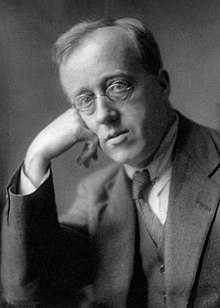
Summary
The Perfect Fool is an opera in one act with music and libretto by the English composer Gustav Holst. Holst composed the work over the period of 1918 to 1922. The opera received its premiere at the Covent Garden Theatre, London, on 14 May 1923. Holst had originally asked Clifford Bax to write the libretto, but Bax declined.[1]
| The Perfect Fool | |
|---|---|
| Opera by Gustav Holst | |
 Holst, circa 1921 | |
| Librettist | Gustav Holst |
| Premiere | 14 May 1923 Covent Garden Theatre, London, England |
In the score, Holst pokes fun at the works of Verdi, Wagner's Parsifal[2] and Debussy. In the opera, the part of the Fool consists of no singing and only one spoken word, "no." One interpretation of the possible symbolism of the opera, from Donald Tovey, is that the Princess symbolizes the world of opera and the Fool represents the British public.[3]
The opera was not a success, and audiences found the story confusing.[4] Although the opera did receive a live BBC broadcast a year after its premiere,[5] performed by the British National Opera Company and relayed from His Majesty's Theatre, London,[6][7] revivals of the work have been rare. In 1995, Vernon Handley conducted a performance of the complete opera for the BBC, broadcast on 25 December.[8]
Ballet music edit
The introductory ballet music is much more often performed, separately as a suite. The ballet music falls into the following sections:
- Andante (invocation)
- Dance of Spirits of Earth (Moderato – Andante)
- Dance of Spirits of Water (Allegro)
- Dance of Spirits of Fire (Allegro moderato – Andante)
Themes from the ballet music recur throughout the remainder of the opera.[3]
Roles edit
| Role | Voice type | Premiere cast, 14 May 1923[9] Conductor: Eugene Goossens |
|---|---|---|
| Fool/Farmer | spoken role | Raymond Ellis |
| Wizard | baritone | Robert Parker |
| Troubadour | tenor | Walter Hyde |
| Traveller | bass | Frederick Collier |
| Princess | soprano | Maggie Teyte |
| Fool's mother | contralto | Edna Thornton |
Instrumentation edit
- Woodwind: piccolo, 2 flutes, 2 oboes, english horn, 2 clarinets, bass clarinet, 2 bassoons and a contrabassoon
- Brass: 4 horns in F, 4 trumpets in C, 3 trombones (2 tenor and 1 bass) and a tuba
- Keyboards: a celesta
- Percussion: 3 timpani, a bass drum, cymbals (suspended and clash), a tam-tam, sleigh bells, a tambourine and a xylophone.
- Strings: a harp, 1st and 2nd violins, violas, violoncellos, and double basses
References edit
Notes
- ^ Bax, Clifford (January 1939). "Recollections of Gustav Holst". Music & Letters. 20 (1): 1–6. doi:10.1093/ml/XX.1.1. JSTOR 728520.
- ^ Head, Raymond (July 1999). "The Hymn of Jesus: Holst's Gnostic Exploration of Time and Space". Tempo. New Series. 209 (1576). Musical Times Publications: 7–13. doi:10.1017/S0040298200014625. JSTOR 957953. S2CID 144407562.
- ^ a b Ottaway, Hugh (June 1974). "Holst as an opera composer". The Musical Times. 115 (1576): 473–474. doi:10.2307/957953. JSTOR 957953.
- ^ Holmes, p. 90
- ^ Holmes, p. 94.
- ^ "Pieces in the Programmes – Holst's The Perfect Fool". The Radio Times. No. 40. 27 June 1924. p. 12. Retrieved 14 October 2020.
- ^ Scholes, Percy A. (27 June 1924). "The Perfect Fool". Radio Times. No. 40. p. 21. Retrieved 14 October 2020.
- ^ Northcott, Bayan (29 December 1995). "On another planet". The Independent. London. Archived from the original on 18 June 2022. Retrieved 4 July 2014.
- ^ Casaglia, Gherardo (2005). "The Perfect Fool, 14 May 1923". L'Almanacco di Gherardo Casaglia (in Italian).
Sources
- Holmes, Paul, Holst. Omnibus Press, 1998 ISBN 978-0-7119-6525-6
Further reading edit
- Holden, Amanda (Ed.), The New Penguin Opera Guide, New York: Penguin Putnam, 2001. ISBN 0-14-029312-4
External links edit
- The Perfect Fool – three selections from the opera
- Chester Novello page on The Perfect Fool


